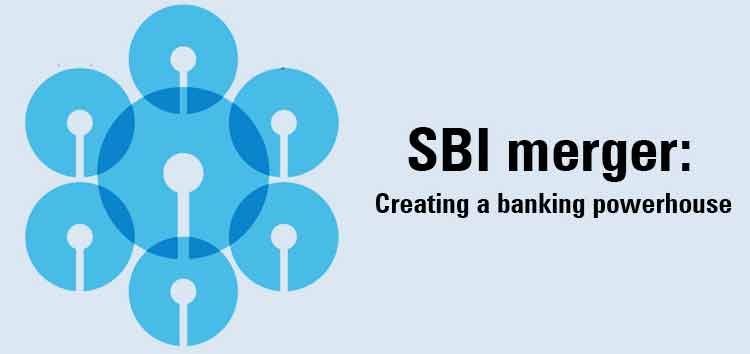
The Cabinet has approved the merger of five of SBI subsidiaries into SBI which will create a banking behemoth in the PSU space with assets in the range of nearly Rs.30 trillion ($450 billion). This will be instrumental in bringing SBI in the list of Top-50 largest banks in the world. Of course, in terms of size the merged SBI will still be much smaller than global banking giants. Consider the following list of the world’s 10 largest banks in terms of assets.
| Name of Bank | Country of Domicile | Latest Asset size |
| ICBC | China | $3,550 bn |
| China Construction Bank | China | $2,982 bn |
| Mitsubishi UJF Financial Group | Japan | $2,901 bn |
| Agricultural Bank of China | China | $2,819 bn |
| Bank of China | China | $2,656 bn |
| HSBC Holdings | United Kingdom | $2,608 bn |
| J P Morgan Chase & Co. | United States | $2,466 bn |
| BNP Paribas | France | $2,417 bn |
| Bank of America | United States | $2,186 bn |
| Japan Post Bank | Japan | $2,022 bn |
Data Source: RELBANKS rankings
Banking, the world over, has traditionally been a game of size and scale. The 10th largest bank in the world will still be nearly 4½ times larger than SBI even after the merger. For SBI to achieve its global aspirations; size is a must and it is in this context that the merger of SBI and its subsidiaries must be viewed.
Under the scheme of merger, SBI will merge its 5 subsidiaries; State Bank of Patiala, State Bank of Hyderabad, State Bank of Bikaner & Jaipur, State Bank of Mysore and State Bank of Travancore into itself. State Bank of Hyderabad and State Bank of Patiala are already 100% subsidiaries of SBI and hence not listed. They will be entirely absorbed into SBI. For the other 3 listed SBI subsidiaries, the merger will happen via a stock swap. SBBJ shareholders will get 28 shares of SBI for every 10 shares; SBM shareholders will get 22 shares of SBI for every 10 shares held; SBT shareholders will also get 22 shares of SBI for every 10 shares held. In additional, the Bhartiya Mahila Bank will also be absorbed into SBI. The combined entity post the merger will have an asset base of $450 billion and will be nearly 5 times the size of India’s second largest bank, ICICI Bank.
Remember, this will be the largest merger among the PSU banks and will be the first step in the direction of consolidating banking operations in India. Since nationalization, there has been tremendous duplicity of branch banking leading to overinvestment in business areas that do not generate adequate Return on assets (ROA). The following are some of the key advantages that will emanate from the merger of SBI and its subsidiaries…
But there will also be challenges post the merger…
There are 3 key challenges that that the SBI merger with its 5 subsidiaries will have to contend with. Firstly, the benefits of the merger will only be realized if the costs are clinically rationalized. Since there will be duplication across businesses, there will have to be a reduction in the size of the workforce. With a strong bank union, this is not only going to be fraught with problems but is also likely to acquire political overtones.
Secondly, at this point of time it is hard to assess the exact quality of earnings in the subsidiary banks. Most of the subsidiary bank balance sheets are not scrutinized with the same fine-toothed comb as SBI. Hence, there could be negative surprises in terms of asset quality in these subsidiary banks. That is something SBI will have to be prepared for.
Lastly, there will be integration pains as in any merger. SBI is estimated to incur a total cost of Rs.3000-3500 crore towards pension and other liabilities which will hit its earnings in the short run. Also, despite being from the same group, cultural differences in any merger are bound to arise.
It must, however, be conceded that this is a step in the right direction. Indian banks are lagging global counterparts in terms of size. This could be a good beginning towards consolidation!
Published on: Feb 17, 2017, 12:00 AM IST
We're Live on WhatsApp! Join our channel for market insights & updates
